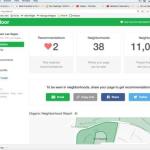For how can i join another neighborhood group in Nextdoor and Nextdoor really use the social network and private, in the same sentence is your homeowner's association using next-door to communicate with neighbors. Next door's growth has been nothing short of phenomenal. What is next door? Next door is an online social platform, somewhat like Facebook, Twitter, and LinkedIn.

This social network is private for how can i join another neighborhood group in nextdoor
The next-door creators claim the major difference is that this social network is private, their goal is to provide you and your neighbors a trusted place to talk online, where neighbors can work together to build stronger safer and happier communities.
Next-door makes it very easy to find locate and target neighborhoods simply with your address. Is next door a good or bad thing as it is with most things in life? The answer to that is it depends on their intention seems legitimate, and if used as designed the potential exists for next door to be a very useful tool, but it's not.
Without privacy concerns, users will tell you having access to so much information about your neighbors, and your neighborhood can sometimes be too much of a good thing. If you are concerned about your privacy you may not care to join. What do you need to know about next-door? Using a social networking site that asks you to post your real name and your home address, maybe a privacy concern at the same time. There's a big book that gets delivered right to your door that contains much and even more of the same information, it's called a phone book still.
Read through the next door privacy policy
It is something to seriously consider before randomly volunteering such information, is next door a nosy neighbor during your due diligence process? Take a moment to read through the next door privacy policy. Next door collects information from you when you give it to them directly or give them to get it from another source.
For example, when you register for next door, you voluntarily provide your first and last name, profile photo, email address, and similar information. If you do decide to sign up with next-door or any other online service, consider not registering by using your other social media credentials. Any time you register anywhere with another social media account, you're giving that service permission to access additional personal information from those social media sites about you.
Next door can also track your physical location, this is called geo-tracking, even if there's no ill intent here, it is no secret. This information has the potential to be used against you when the general public knows where you are, they know when you are not at home, this information in the wrong hands may leave your home vulnerable.
The information provided to next-door is private and valued
Next doors fine print reveals that if you want to allow next door to show you where you are on your neighborhood map, to take the photos of your posts, and events by location to verify your address where available or to display activities and content, that may be relevant to your current location.
They may ask your permission to access geolocation information from your mobile device if this sounds familiar it should because this is what other social networks are doing as well. Next door collects information and stores data about the computer smartphone and other devices you're using to access their site.
This practice is nothing new, and nowadays this is common, this type of information is collected and shared to develop custom profiles about who is using which services and on what types of devices, so that those collecting the information can better target their ideal markets, every device that accesses the Internet passes this type of information along.
It's possible to use that information to expand their business
Another important thing to know is that when you invite your neighbors to join next door, whether it's providing their email address or their home address, you're giving that information to next-door and they are going to use that information to expand their business.
That's why next door is expanding exponentially a general rule of thumb, and best practice is to not share other people's information without their permission. The bottom line is to just remember that it is in the best interest of any business to make a profit, it's up to you to decide.
If you trust the business enough to have your best interests in mind as well, a Cree community took a closer look at next-door and put together.
The pros and cons of the platform
This list of pros and cons of the platform. The good next door will mail out postcards to all your neighbors inviting them to join your new group, you can chat up community events, like garage sales or pool parties, it is easy to search for help and give contractor recommendations.
Your neighbors will help you find your lost pet, it's a great way to buy or sell a piece of furniture or accessory or automobiles without having to leave your house. There's an urgent function which allows you to blast everyone in your neighborhood who is signed up for next door with an email. You may be able to catch a thief easier.
You will know more about your community, the bad people can share way too much and many times, things get ugly rumors about the community that in most cases are not based on fact, do more harm than good. Personal disputes may get aired publicly, inappropriate posts may get missed become too overwhelming for moderators to keep up with or the group may become neglected.
Make your unique login not using other social media profiles
Do you want other users to know that much about you? You may be disappointed in the uncharitable things folks say, and your privacy may become an issue, next-door owns everything you post, even if you delete your account. Only you can decide if using a service like next-door is something you want to do, perhaps bringing it up at your next meeting for discussion and sharing.
Some of the information we have provided will ultimately make your community a stronger safer and happier place, the next-door sign-up process signing up with next-door is easy as mentioned, earlier it is advisable to always make your unique login rather than using other social media profiles like Facebook.
If you choose to log in using other social media profiles you may end up granting the next door app access to the contents of your contacts, friends, and email addresses. The process starts by adding your home address and your email address, next, you provide your first and last name, a password, and gender.
Adjust your privacy settings within your account settings
Once you sign up, your address is geo-located, who you are, your full name, and where you live is now easily discoverable by all members of that regional area. You can adjust your privacy settings within your account settings, creating a group.
Do you think you live in a pretty progressive open-minded community where everyone shares your values? If you are a member of a next-door neighbor, you can create a group within the neighborhood for your neighbors who share the same interest, your group can be public or private according to the next-door website.
The differences between public group and private group
Here are the differences between the two types of groups, public groups are open to anyone in the neighborhood, they allow any neighbor to join the group immediately without waiting for approval. They allow any neighbor to read the group's messages, whether or not they have joined. They have public member lists.
Private groups are limited to just the people moderator ads or approve, they have messages which are only viewable by the members of the group, they have private member lists, just like many other social networks. It is often good practice to make the group private, this will ensure there are some moderation and control of your group.
If you create a private group you become the original moderator with private group moderators, approve members, and moderate or remove messages. If you are in a homeowner's association and want to create a group, be careful not to name the group with the corporate name of your community, as it can cause legal contention for your association.
Another great practice is to add a descriptor that the group is not the official voice of the community, but simply a place to communicate, and exchange information between neighbors.




